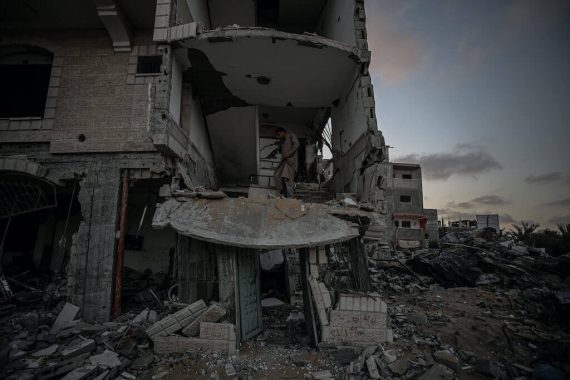It was five a.m. in Gaza, Monday, May 18, 2021. Five of us were catatonic under our blankets. Five percent battery is left on the only mobile device we had in the house. Five missiles had fallen near my house since dawn. Five times per minute, I begged the ceiling of this room, “Don’t fall on our heads this dawn.” I was filled with regret and ended up looking at the ceiling of my room. I recalled the many times I stuck balloons on it. I wished that my ceiling would understand me and I could ask it to fall on our heads softly, so that it wouldn’t wake up my little sisters and scare them.
It is still five a.m. My mind is awake, but my body is lost. The only sensation is the heat of a fresh tear streaming down my face. Even this sensation is stale because this tear reoccurs regularly as I relive this nightmare for the fifth night. This tear is a reminder that it is time to say goodbye to everyone dear to my heart.
It is time I have to respond forcibly again to the continuous calls of an unwelcome visitor called “death.” Today is the 10th day of the war and I have slept limited hours. I woke up after two hours of sleeping to the sound of a bomb exploding nearby. This has become a daily routine since the first day of the war. I stretch my shoulders with my half-opened eyes, feeling so lucky the pillars of my house are still standing. The small bag where I have collected my ID, certificates, and pictures of my siblings and myself, my kindergarten graduation picture, the first stories I ever wrote, all the letters written by my friends, and 40 shekels I was given this Eid stays close to me, within sight.

VIDEO: Nakba Survivors Speak: “The sky was our blanket and the ground was our mattress”
Luckily, I can collect these concrete things, but there is no way to collect all the insignificant fights with my younger sisters, the giggles that filled this house, the tears we shed, and the prayers my mom said to make the pillars of my house stand. These warm memories are hidden in the corners of my house, between the empty spaces, and are held tightly in the hearts of everyone here. Like every morning in Gaza, I start my day by counting: I count five souls; I count five minds with an endless number of dreams that have never been fulfilled; I count five mouths that tell stories of evading imminent death for the thousandth time.
My little sister, Malak, 4, clings to my trousers asking me to stand by the bathroom door, to guard her. Shivering in fear, she begs me not to leave the doorway; she begs me not to leave her. This fear is all she knows. She will never know of the everyday luxuries that Gazans cannot afford to experience since the first day of war. My youngest brother, Ahmed, calls out that my sister’s milk has been boiled and is ready. Even a simple cup of milk carries with it the connotation of death in Gaza.
I lost my dad at the age of four; the same age Malak is today. To this day, I do not allow myself to remember the sound of his voice, or his laughter, or even his anger.
I remember the 2004 military operation in Rafah, which most people I know have never even heard about, let alone lived through. I recall sitting in my aunt’s lap, drinking a cup of milk, trying to cover with my gulps the nearby tank shell sounds. My aunt ordered me to cover my ears so I wouldn’t hear my father’s screams as he fought for his life right before my eyes. I lost my dad at the age of four; the same age Malak is today. To this day, I do not allow myself to remember the sound of his voice, or his laughter, or even his anger. The only recollection I have of my father is the murderous scene, and his pain, that I witnessed at four. To this day, I refuse to drink milk.
Many people, even those closest to me, do not understand the pain that I hide behind my eyes, behind my smiles, and my laughs. I have lived with a brutal pain since the age of four. I lost my dad in Operation Rainbow, during a barbaric Israeli assault carried out exclusively against the camp I lived in, Tal al-Sultan.
I have created unforgettable memories with my dearest friends, having forced a smile onto my face to hide the great loss I’ve witnessed all my life. I’ve fooled my teachers, my colleagues, students, and strangers with these forced smiles and hollowed laughs. Behind my face of painted content, I hide the face sculpted by an ugly occupation. I am sorry to all who know me, but I am not sorry to the world. This is the brutal reality of occupation.
I used to spend my day during wars glued to news channels, reading mystery and crime books, tweeting, and making sure my dear ones are still alive.
Sometimes, you can’t afford to speak. Pain is born secretively within us, and sometimes a pain is so big it can only be handled individually. Speaking about it requires bravery.
I used to spend my day during wars glued to news channels, reading mystery and crime books, tweeting, and making sure my dear ones are still alive. It’s evening now. Evening has been the ghost that Gazans fear. The evening collects souls in their homes. But now, the daytime is no different. Bombs drop day and night.
The only difference is the morning is more trusting. “Sahar, don’t forget to wear your abaya before you sleep,” my mother and every mother in Gaza repeats every night. I wear my abaya with my hijab, and put the slippers in a way that makes it easy for us to run away if needed.
It was two a.m. when the Israeli occupation forces shelled Kullab’s family house in Tal al-Sultan camp located in the city of Rafah without any warning, only 20 meters from where I live. The sound of the barrel bombs fire cannot be described in words. I can still hear the ominous sound buzzing in my ears and my mom yelling to us to evacuate immediately. Here in Gaza, we are not being bombed because we are engaging with the enemy or because a rocket was launched over “Israel.” We are bombed and wiped from history simply because we exist in Gaza.
I counted the souls again, wore the backpack, and retreated downstairs in a blink of an eye. We were not alone running in the streets, all of us heading to the unknown. Fortunately, we could see the roads clearly enough because the bombs in the sky gave the illusion of daylight.
Recommended
After a quarter of an hour of being lost in the chaos, we found a place to stay at a friend’s house. Our eyes did not even blink that night; none of us were able to sleep till the sound of bombs temporarily stopped. Two hours later, we returned to our home. “We shall meet soon, dear friends,” I said.
When I returned back home and turned on my laptop, a barrage of messages flooded my screen and eyes. Sahar, are you okay? Sahar, I heard your name on the radio reporting the latest shelling! Sahar, I’ve been trying to reach your mom since yesterday! Dozens of messages that could be reduced to the same question: are you alive? I was counted dead for more than 10 hours as a result of the misspelling of my last name. I burst into tears and was torn into millions of unseen shadows. I responded to the first message I saw in my inbox: Survivor Number Five.





